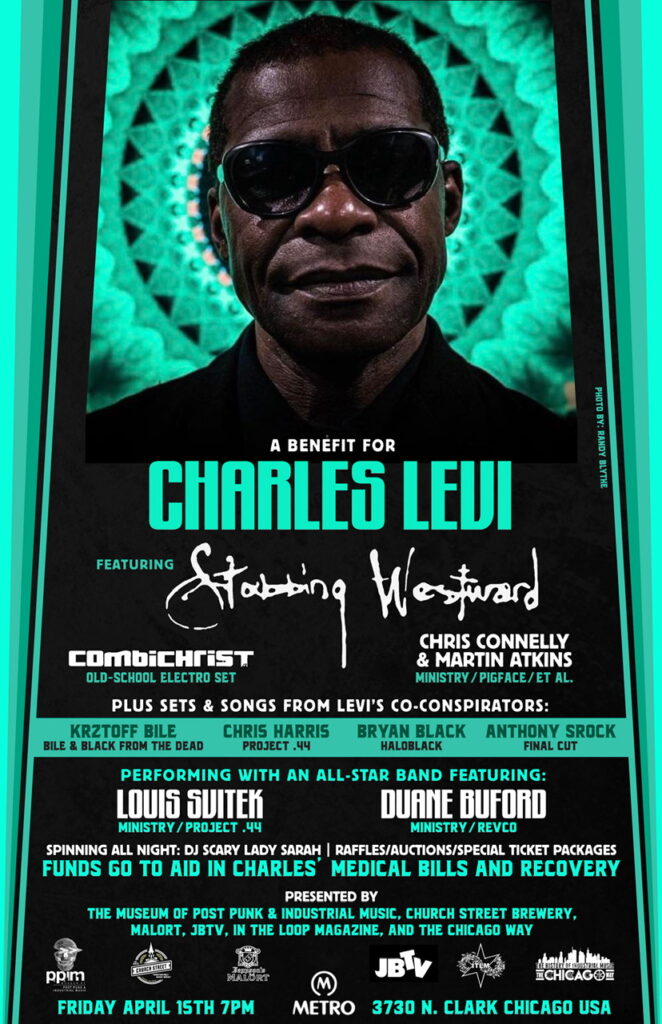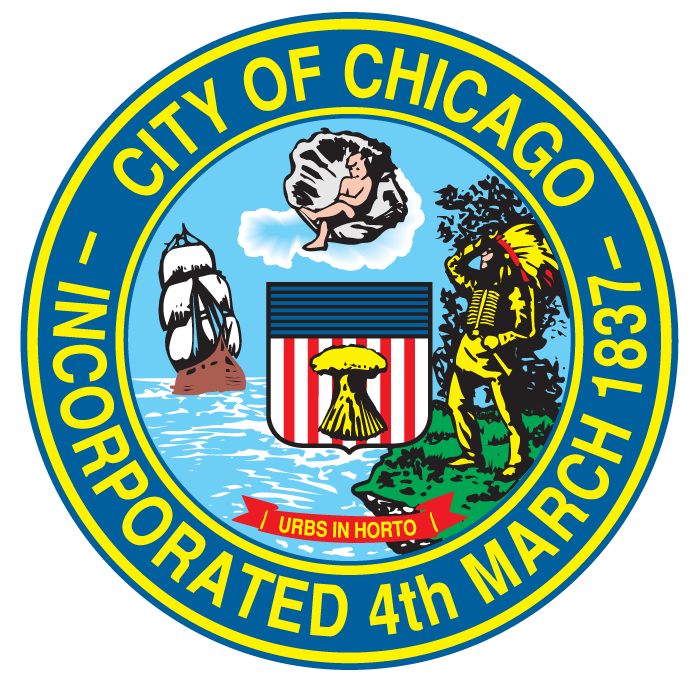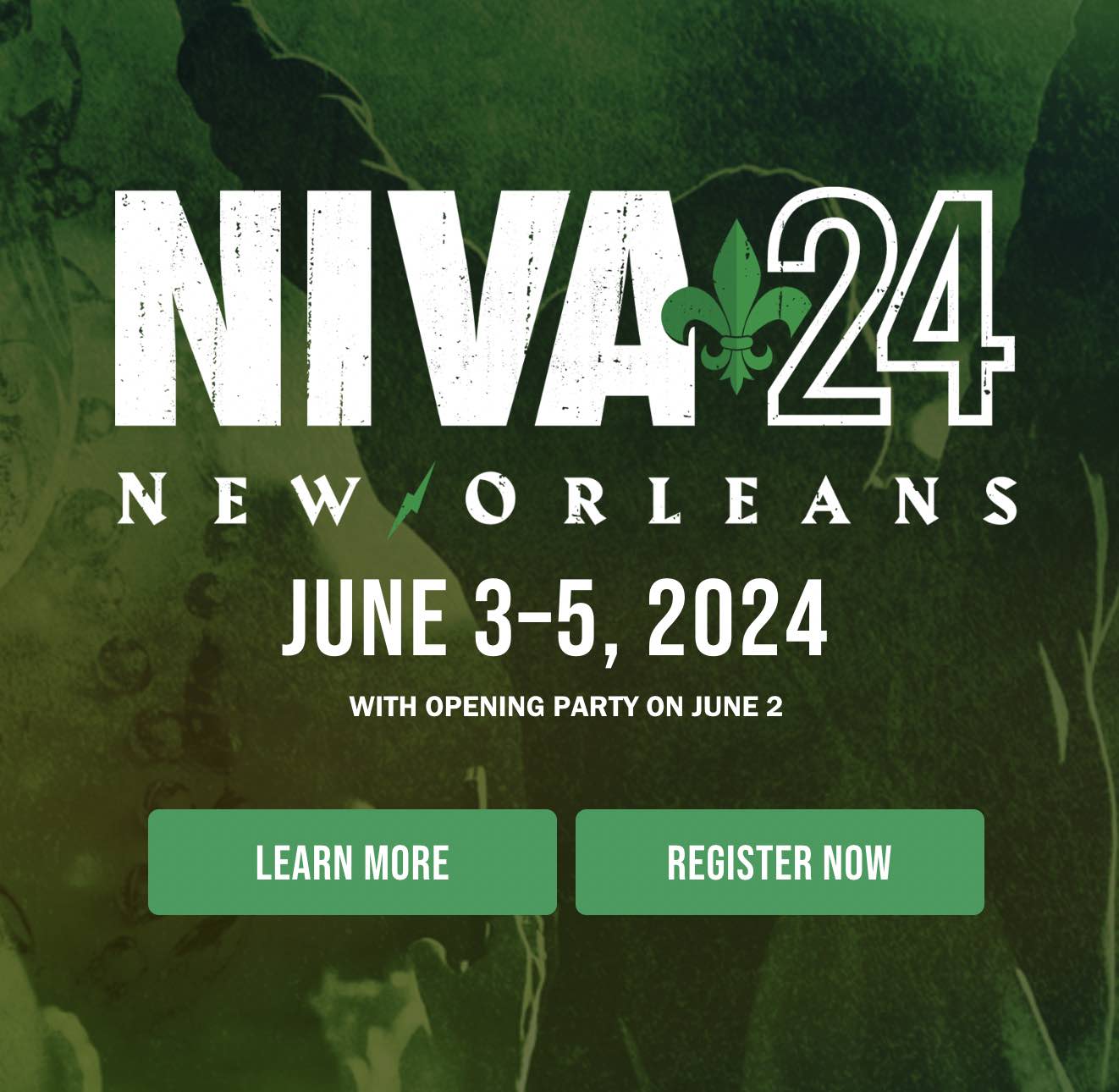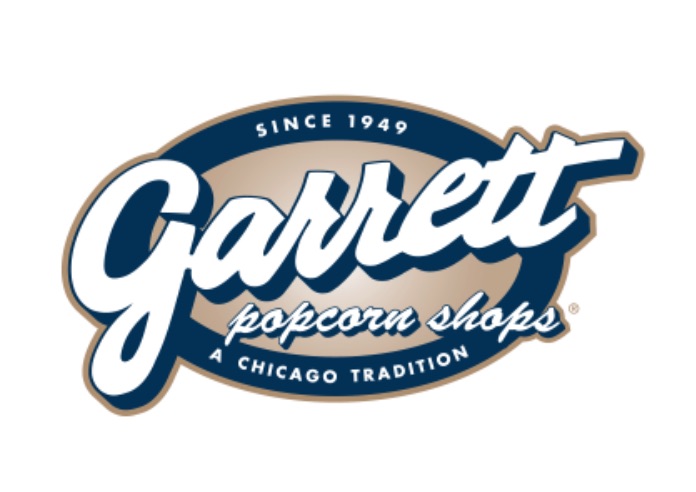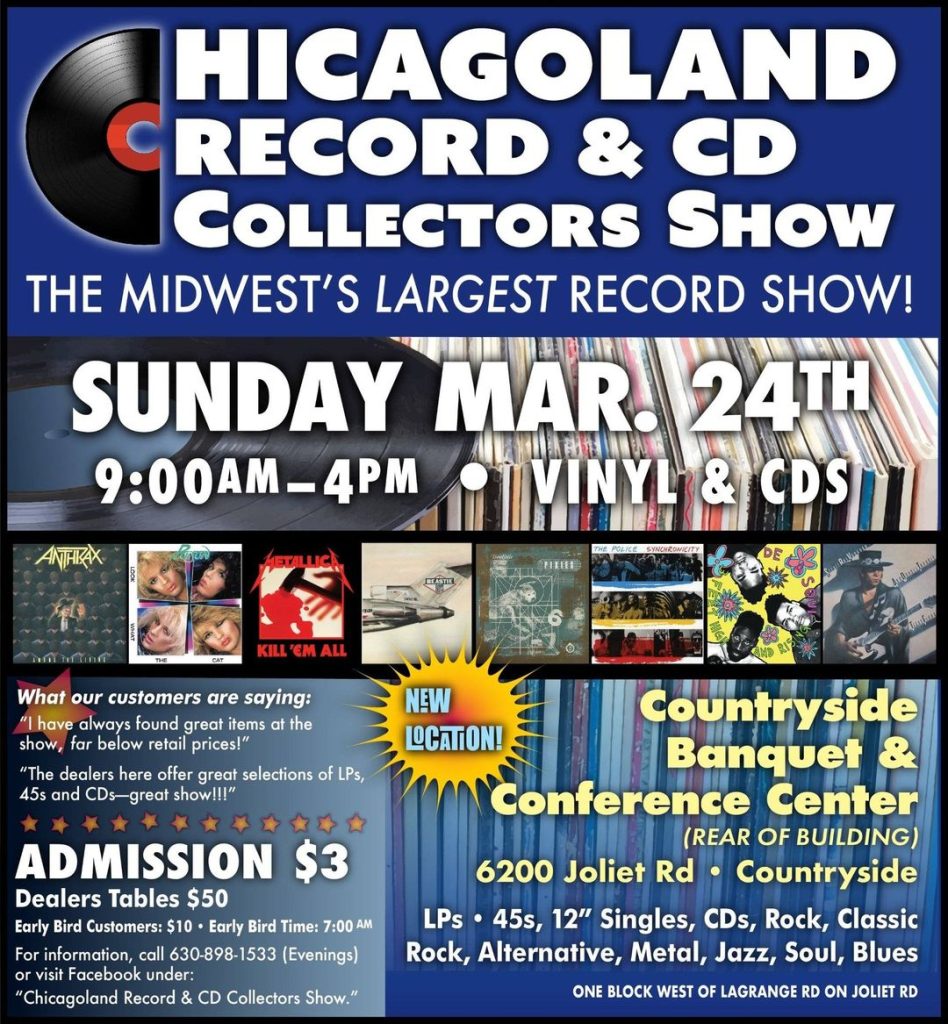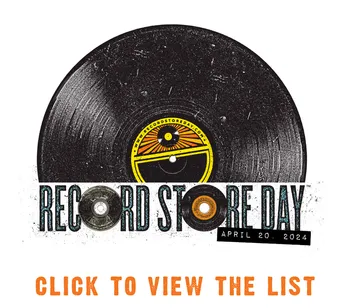Latest News
- Legendary Mask Maker, Zagone Studios, Approaches Fifty-Years Of Innovation Right Here In Chicago
- Photo Gallery: John Spencer @ House of Blues Chicago 2025
- Photo Gallery: Los Lobos live at Space (Evanston, IL) 2025
- A Swingin’ Sleigh Ride: Squirrel Nut Zippers to Hit the Road for the Holidays With One Night Only Here In Chicago
- Hubbard’s Phenomenal Fall Series Stresses The Urgency Of Human Connection
- Martin Atkins Resurrects A Post-Punk Beast As Killing Joke’s Extremities Roars Back To Life At Reggies For Two Nights
The Double Kick: Chicago – Vol 1 – Kris Myers & Mike Del Principe
Dec 30, 2016 James Currie Features, Interviews, Music News, Reviews 0
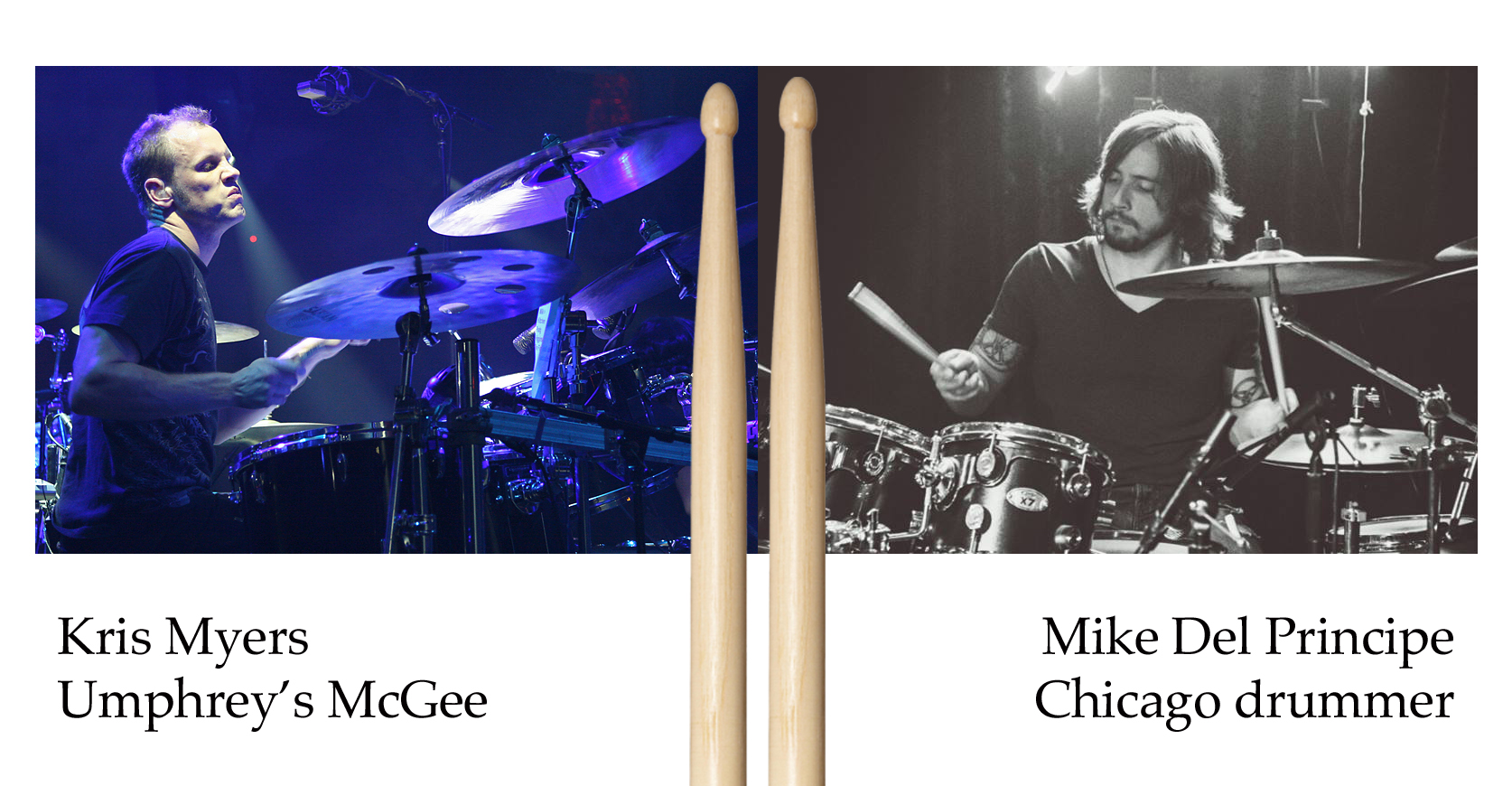
By Jamie Dull
Hello and welcome to the very first edition of The Double Kick: Chicago. My name is Jamie Dull and I am a professional drummer and teacher. I have been pursuing a career in music nearly my entire life and currently play in multiple Chicago bands. I came to Chicago eight and half years ago to expand my network and and push my career to the next level. In that time I have learned that every drummer goes through their own unique, special journey while pursuing their dream. Chicago in particular is a massive cultural and musical hub. Musicians from all backgrounds and styles perform and live here. Our city is a wonderful location for the arts and everything that comes along with that. However, pursuing a career in music or the arts in Chicago is not easy. It comes with its fair share of hardships, challenges, let downs, or however you want to put it. But musicians thrive here. Some of the best players in the entire world have started out here. That’s why I began this series. My goal is to give our readers a glimpse of what it can be like for up and coming drummers in a city like ours by interviewing two different, distinct drummers from Chicago. One who is already touring, playing and recording at the national level, and another who is currently working towards the same goal, but at the local level. You will see the tremendous differences between each drummer and their paths, but you will also learn about some of the difficulties that come with the territory.
For the very first edition of The Double Kick: Chicago I spoke with Kris Myers, drummer for the critically acclaimed band Umphrey’s McGee and Mike Del Principe, drummer for local Chicago bands Bronson Rock, Great Sky Band, Thinner Teed and Rusty Gates. Last night, December 29th, Umphrey’s McGee kicked off the first of three shows in a row at Chicago’s Riviera Theater to celebrate New Year’s Eve. Tonight and tomorrow they’re finishing their three night run at the Aragon Ballroom in Chicago’s Uptown neighborhood. They’re fresh off the release of “Zonkey”, a new album composed entirely of “mash-ups”. One thing Umphrey’s has become known for throughout their career is their live show and their creation of amazing versions of songs, mashed together to form an entirely new piece of music. I HIGHLY recommend listening to it!
And if you were lucky, last night Mike Del Principe played an unofficial Umphrey’s McGee after party at Chicago’s Uptown Lounge with Great Sky Band immediately following Umphrey’s performance at The Riviera Theater. They played soulful, loving music reminiscent of The Allman Brothers Band, Grateful Dead, The Band, and more. Their high energy shows consist of dueling guitar solos, intense jams and beautiful lyrics which make for the perfect way to wind down (or keep partying) after a kick ass Umphrey’s McGee show.
Now to the main event. Please take the time to read about each drummer’s unique experiences, and as always, thank you for your time and support. Let’s get started. First and foremost, my interview with Kris Myers, immediately followed by my interview with Mike Del Principe.

Jamie Dull: What is it about playing drums that keeps you coming back for more?
Kris Myers: It’s kind of an infectious, naturally enticing experience. It’s almost a meditative thing for some people to just be able to jump on your instrument. It’s not all just business. It’s something you enjoy, which is what everyone talks about when they hear you’re a musician.
“Oh, it must be great doing what you love for a living”, they say, but they don’t always know the financial constraints we deal with. Beyond all of that it’s the pure creative and artistic passion that you always want to keep fresh – kind of like when you’re cooking food.
When you’re a chef, you want to always make sure that even though you’re cooking for other people, you still enjoy what you’re cooking as well. It is this basic thing that we can’t lose touch with, and gives us a reason why we’re doing what we’re doing. This is a reminder for me to keep on it, and to keep practicing when the time permits to keep up on my craft.
Jamie: Can you tell us a little bit about your early days? Do you remember the first time you were playing in a group and thought that you might be able to do this for a living?
Kris: Yeah. I didn’t really know that I had a chance at it, probably until the end of my college undergrad years. Before that I was playing in high school pretty actively in the local band scene in various genres – some subcultures out in the suburbs throughout the 90’s. I was doing it for the sake of playing something expressive, and doing something of which I felt confident about. While growing up in the Chicago burbs, one would find the environment to solely revolve around sports and competition. Even though I was athletic and active with sports, I needed a creative passion; an artistic outlet. I was enjoying the company of others in music, so my social network was kind of built around music.
I started taking it seriously when I was attending Elmhurst College in the music program with a newfound interest in jazz. I was in the jazz band with acclaimed director Doug Beach. I owe a great deal of gratitude to him for my development as a musician. He really taught me to dig deep inside and figure out what it is that I wanted to do and how I wanted to do it. He helped me learn that if I do it, I have to do it with strength and indomitable will. I have to find the confidence in myself to play at a certain level, and most importantly, to listen and understand communication through improvisation. That’s
when I started getting gigs, subbing for my drum teacher, Bob Rummage, at the time. He’s another guy I owe a lot of gratitude to because he gave me a lot of opportunities to play locally. I started out playing weddings and “jobbing” gigs, corporate events and that sort of thing in the downtown area in all of the hotels. I was doing that on my own while learning the discipline of being a good player and a good reliable musician. I went through a pretty heavy personal inventory to figure out what it takes to survive as a musician. Once I learned how to maintain my playing level to a higher degree, I also had to learn a lot about business, how to manage my time, and how to be reliable or easy to work with. Part of that means having to learn about humility and the ability to take criticism, which, unfortunately, will not always be delivered in a respectful manner.
Those things to me are equally as important. And if you’re willing to go the distance on shaping your sound, while doing something for an employer, or someone who hires you as a bandleader, then it’s all win win. You’re going to get more experiences. That’s kind of my personal experience. I was fortunate enough to start gigging at a young age, in college, professionally. These opportunities, of which I’m grateful for, motivated me to be better with being on time, trying to work with others, and get along with others. That’s what showed me the doorway to a lot of opportunities.
Jamie: Was there one specific show in the early days that was a big turning point for you?
Kris: Sure. There were a couple of things before Umphrey’s. One with a band that I was playing in called Kick the Cat. That was a group of really prolific musicians in Chicago. One of the members was someone I went to college with, Chris Siebold. We were roommates in the early 2000’s for a few years. And prior to that we were college friends and were in a big band as well together, as well as small jazz ensembles. I learned a lot from him. I think when I started playing out regularly with Kick the Cat with Vijay Telis Nayak, Chris Clemente, and Chris Siebold (yes, that’s right, 3 Chris’s and a Vijay!)
These guys really taught me to be a studio level musician in Chicago, and I had to learn some really difficult music for a while. It was a process. But once we got into a groove other musicians in Chicago would come out and see us play regularly. It was eye opening that I could relate to these other serious players, whom of which I was trying to gain some kind of respect from.
I started to become a part of a big community of players coming together, supporting one another, which I thought was very encouraging. It was a good feeling to know there are other musicians, some more competitive than others, who still come to support and respect your abilities.
In terms of a particular performance, I don’t know of any right off hand. I did play with the Rob Parton Orchestra. He used to play Fitzgerald’s a lot, and big jazz festivals, and I got to play on that seat to sub for Bob Rummage, my teacher. I used to do it all of the time. That experience was amazing. To me big bands are the hardest roles for a drummer to play.
I remember playing the Elkhart Jazz Festival. That one was a significant change for me. I thought I did really well at the show. I felt that I earned my colors, or my wings or whatever. I think the main development came from Kick the Cat and that big band in the early years.
Jamie: Can you describe what has been your worst load-in experience and or worst show?
Kris: One I can remember as an independent player was loading into, I believe it was The Drake Hotel in downtown, Chicago. There were a lot of hoops to jump through to get to particular ballrooms. Maybe it wasn’t The Drake. It was one of the big hotels back in like ‘96 or ‘97. It was my first jobbing gig outside of the school program and I was supposed to play with some really serious players. I was on time for the load-in but was late on the transporting of my gear because, if I recall, there were a lot of elevators and flights of stairs I had to go up, with all of my gear. I had it all on a cart, but the cart wasn’t big enough for everything. And I couldn’t really keep my car where it was either so I had to take all of my stuff temporarily into hallways and stuff, run back to my car, run back to the halls. And I think I remember my directions inside the building being messed up, so I showed up just before showtime. That was a horrible situation. Being late is never good. It was just strenuous, like trying to lift my hardware case through elevators and flights of stairs, and running in my tux being totally sweaty and nasty. By the time I hit the stage, it was stressful.
I had one time with the big band too where I got lost with the directions I was given. Sometimes you’re loading in when the audience is already sitting down, waiting for you. And I’m loading in right in front of them. I think my biggest issues in the early days were just punctuality. Sometimes I would get my directions wrong. I had at least a couple of gigs like that with the big band, and the small groups. I’ve loaded into all of those loading garages all over town in below-zero temperatures. You have to come prepared and bundle up and there were times where I wasn’t, and it was difficult.
I also remember one time with the college big band we played in Jakarta, Indonesia, I think ‘97. It was an amazing experience but I think it was like 60% humidity or something crazy. It was super hot and we were loading in and out of these venues really fast, and it was difficult to concentrate in those conditions. But this was all before my career with Umphrey’s.
Some of the most strenuous load-ins with Umphrey’s were back in the day with the van and a trailer. For the first couple of years I was with the band it was pretty tough. I mean we would be on little sleep and needing to load in. That was the hard part about the jobbing gigs, sometimes it wouldn’t always pay off. As long as you’re aware of things, when the opportunities come you have to be grateful and treat it with respect. I think that when you do those crazy load-ins and stuff it’s a character building experience if anything. Just another arduous task to get to do what you want to do. Just an obstacle that we have to deal with. But physically, at least you’re staying active. I mean you have to be positive about it [laughs].
Jamie: Haha, agreed! So it sounds like Chicagoland was pretty instrumental in your development as a drummer. Do you think you would have had the same results had you grown up playing somewhere else?
Kris: Good question. The only way I see it is we are one of the major cities in the U.S. so if you’re around that metropolitan area your chances of getting more opportunities are probably bigger. But that’s not to say somebody from a small town couldn’t. There’s a lot of little pockets in the country that breed great musicians in those particular cities. I think location has something to do with it but it’s also about community. What kind of community you’re in. If you’re in an area that, say, takes a while for you to get to a venue or something, that might be a hinderance on your development, but that won’t stop you.
I grew up in Inverness, Illinois which is an upper-middle class neighborhood for sure, and I just couldn’t relate to people in our neighborhood because they were sons or daughters who were almost going down the same path as their parents. I was fortunate to have the support of my parents to let me decide what I wanted to do and who I wanted to be. Living in a particular area geographically back in the day definitely affected my development.
I chose Elmhurst college over other colleges because I didn’t want to leave town. I wanted to be centrally located where I had access to both my family and the music scene in Chicago, which was a sprawling scene. And I made the right choice. I had opportunities to attend North Texas and University of Miami and I decided not to. I wanted to be one of the bigger fishes in a smaller pond, I suppose, but it’s not necessarily true. I’m not one of the bigger fishes. There are plenty of greater, bigger fishes out here. But the point is there are opportunities. It takes crucial time to develop. That’s what kept me staying in the area. Back in the day before technology was ruling the world with social media marketing and whatnot, you went out to shows to meet players and to take lessons from people. Become an understudy or apprentice or whatever you want to call it. Then you’d sub for them for gigs they couldn’t do. Then you’d get numbers for more work. Back then it was a word of mouth thing. Now it’s just all automated. No matter where you are geographically you can record tracks in a different studio and then send them somewhere else. It’s a whole different ball game. Back then you had to be there.
Jamie: Do you feel that social media has changed the game for up and coming drummers? Is it easier to get yourself out there now, or is it more difficult to become noticed among the millions of other users?
Kris: I feel that some people would agree that we’ve made technology to make things easier on us, when in fact in some ways we’ve made it harder. I think that yes it does help get you out there more these days, but that doesn’t necessarily guarantee that you’ll have a higher probability to get a gig. Today everyone can make themselves look perfect in their social media world, but that doesn’t mean someone is going to do better with their performance. So now when people are looking for players they can communicate everything online instead of being present. It takes more than just that. I think it has made people more disposable.
Maybe some will disagree, but I feel like social media doesn’t really help a player do things at a higher level. It comes down to being with players one on one. Getting along with them. Getting on the road with them. See how they react to things, see how they are socially. You can’t really use any kind of technology for that. I’m not sure it really helps or not. I mean it helps the promo game. I, myself am trying to up my game next year and see what happens with my side career, with promoting, having a better website, better engagement on my Twitter, Soundcloud, Facebook, and personal site. I have to do all of these things that I don’t necessarily want to do, you know? I’m too old school. But I have to do it to see what happens. It could work for some, but it’s not the end-all-be-all.
I think you have to meet people one on one. Hang with them. I don’t know if people are getting more or less work because of the way the economy flows decade to decade. I think when I was looking for work in the 90’s it was a little more of the old school model, which there was a lot of work to be had. These days the well is running dry and everyone is scrambling.
In the major markets like Los Angeles and New York people are trying to find another place to live and be able to play music and make a living. There’s a big migration right now because the well is running dry. It has a lot to do with where the record industry is right now too. Are records selling? The answer is no, so what do you do about that? Do you join a large touring band like Umphrey’s? Well, that requires being available to take the risks involved, and a lot of people aren’t always willing to do that. Risks meaning, like, not making money for a while and putting a lot of time and effort into it, which STILL may not guarantee you’re going to succeed. That’s what I think it comes down to for getting more work. Understanding your solutions for dealing with those climates and environments because it indirectly affects the work opportunity you get, regardless of how great your social media game is. I know guys that are so on top of their game. But it may not necessarily guarantee that they’re going to get that big break.
I’m learning that in the publishing world too. I have a publishing company called Goodnight Nurse Publishing. We’re just getting started and it’s really difficult to get people to put us in their circle and take our music seriously. Our social media part of it is really solid but there’s always someone who’s going to criticize.
You can always use the tools needed and it might up your chances for sure, but only to a certain level. The rest comes from being there at the right places at the right time and meeting the right people. Most importantly, it comes from “how bad do you really want it?”
Jamie: Yes. And you even have to spend years building up the craft of being a good drummer on top of all of that.
Kris: Yeah. For sure. You can use social media today, and it looks good, but there’s only so much it can do. You just have to hope that those opportunities are still going to be there. And it might take someone a while to recognize you even after being in a city for years. It takes a couple of years to succeed in any major city. And people factor in now how many followers you have to some degree. They’re seeing how many people are interested in you as a player. I think a good website is necessary. Just to be presentable, professional, and feel good about it. For peace of mind. You know, I’m trying to build followers with my own endeavors outside of Umphrey’s, and it’s not easy. You have to put time into it everyday. And I’m still learning that. But it’s a part of the new age musician, for sure.
Jamie: I’d like to switch gears a little bit now and talk about drum techs. When did you first realize that you needed a tech and what was your first experience like once you hired somebody?
Kris: I have been learning more and more every year how to build my relationship with my drum tech. And it’s been a while now since I’ve had Robbie with me. And he’s become our stage manager as well so he handles other people and their gear too. But we started out with a relationship that was primarily focused on just getting the job done. Getting things transported and put into place that was good enough for me to do the tweaking.
We had a lot of ups and downs through the years. You have a very close relationship with your tech if you want it that way. You want to be able to let them know what you like and you also want them to have a good attitude towards helping you. As long as you’re being respectful to them. That’s very important. There have been a lot of misunderstandings over the years. You know, in the moment things get a little punchy but it’s been a learning process that involves a learning curve with personalities over the years.
If you’re respectful then they will be more motivated to help you and will learn more about the craft so that they can be more prepared. My drum tech and I have grown together over the years as people getting to know each other. We’ve become more knowledgeable of the ways to efficiently handle situations when they come up. You know, if we need something in a time sensitive manner, how do we go about it? And how do we handle something when it doesn’t work out? That’s just as important. People can crank out gear from endorsement companies in an unrealistic time frame. Like, say you just broke your last piece of hardware. That needs to be shipped out and replaced within a day. Sometimes that’s just not doable. They might not have it in stock. And that’s just the way it is. Sometimes things are beyond your control. You have to prepare yourself for those moments. I used to be really frustrated, thinking, “Why can’t I get what I need? This is just common sense”. But, you see sometimes there is no common sense with the way things are. And you have to be able to handle it and accept it.
Unfortunately some people end up getting the perception, like, “Oh, he works for me!” and get angry and yell at their drum tech, you know? Sometimes that will happen because we’re only human, but I’ve learned over the years how to be more respectful and to build that relationship, which is more important than the gear itself. And that’s the way our organization is. Other people do it differently. Other people will assume more of a business based mindset where the relationship only goes so far. So if somebody screws up, they get someone else. They fire them. It’s a tough decision to make, but we would prefer not to go that route. We would prefer to learn the pro’s and con’s of the situation and work them out through time and patience. I guess that’s how it’s been with me and my drum tech.
He does a great job helping. He’s smart, has a good sense of the business and a lot of experience. He’s older than I am so I give respect there in terms of wisdom and maturity. You have to take all of those factors into account when you decide who you want to have working with you. Sometimes they have an outgoing, bold personality. Sometimes they’re quiet and are willing to take the bruises, or whatever. But in my case I have a guy who has a great personality and character, and reminds me that it’s not all about me [laughs], which is important. I am grateful for Robbie.
Jamie: Excellent answer. Thank you for that! I’d like to switch topics again. How do you feel that you developed your own sound and style as a drummer? Did you work on it specifically, or did it reveal itself to you over time?
Kris: In every way it’s up to you as a player to decide how to go about it. Everyone has a different approach, a different mindset and chemistry about them. So it’s up to you to decide what your method is. You are given curriculums and opportunities through school, regiments from practicing with your band or other musicians, or maybe you’re getting a certain academic level of knowledge exposed to you. It’s up to you to decide how you want to be about it. Given the nature of how things are going in your life, it’s good to surround yourself with the right people to motivate you to do the right things and make the right decisions in your life. I think that was crucial to my development. I would think about why I’m doing this, and kind of blindly go into things without knowing the inspiration behind it. When I look at other players, and look up to them, I see what they do. I look at the detailed aspects of their life, and what they’re like, and how they go about things. You have to dig deep and find a way to learn to succeed and set the realistic goals that you want to achieve. You have to find a way to coach yourself. I hate to use sports analogies because our bass player does it all of the time and it drives me crazy. He’ll be like, “You got a bad attitude? You’re benched!”, (laughs). But I do agree in that it’s a selfless endeavor to get out of your head a little bit and look inward at yourself and see how you view your development based off of how and who you are. What you do, how you do things and why. If you’re an open, sensitive person, that will determine how you react to things. How you learn things. How you take failure just as much as you take your successes. Some people are too anxious or self conscious, but that doesn’t make them a bad person. It’s how you accept what you’re doing with the tools you’re given. It’s the nature of things. You want to focus on changing your sound. You want to focus on doing what you’re still doing, but doing it better. Figuring out your strengths and weaknesses. All of that stuff is going to be there and you’re going to have that through any good teacher or coach. They’re going to teach you those fundamentals. It’s just a matter of what you do with it and how bad you want it. It takes intelligence and drive. I think it takes a good balance of things to start with. Start by setting realistic goals. If you’re going to dream about being the biggest pop star, that’s admirable, but be realistic. Start out with maybe being the best player on your block. And then move on from there. How can I be heard? What does it take to be a better player? Does it mean playing a bunch of notes and showing off? Or does it mean accompanying a soloist in making the music sound better by playing less? That to me is a learning experience. Some people all have different interpretations in what they think is a good drummer. And sometimes it’s not fair. You may deal with unintelligent people out there who are disrespectful to your craft. We have the ability to interpret more things on our instrument. The dynamic, the direction, but people rely on you for that. Like you’re the leader or the quarterback. So if you’re not doing things exactly the way that they want it they’re going to assume that you’re not a good drummer based on what they think is best. And that’s not always going to be fair. You have to learn to accept that, learn how to take it, and learn whether you should listen or not. That’s part of your development as a player. That, to me, is important in all things in life. That’s kind of how I go about it. Over the years I never wanted to compete or worry too much about what the other people were doing. Although I do to some degree. You want to be able to compare yourself to your peers to know what’s cool, what styles are happening that you should try to develop. But don’t get too wrapped up into anything. Keep a good balance of things. Your fundamentals, setting realistic goals, and accepting failure and how to be about things. Don’t be so hard on yourself. Be determined, be a perfectionist if you’re an artist at heart, but don’t obsess. If you need to take a break and walk away, do it. Have other things in your life going on. Have a social life. Have friends and regular relationships, and most importantly stay healthy. If that includes having a side job waiting tables or doing whatever you have to do to make a living, do it. Don’t become a tortured soul. You don’t want to create more discomfort than what needs to be there to reach your goals. It’s simple, commonsensical things. You know, I have made bad decisions a lot in my past. I learned from them. I almost want to learn from them the hard way. Sometimes it’s the only way. You have to be willing and courageous to deal with that stuff, and then persevere. Because you never know. Maybe when you least expect it, finally, someone’s going to be there at that show you’re playing who’s going to give you their number or their card, and you might end up recording on a big session. I did that with a few gigs in Los Angeles where I ended up meeting a whole other level of connections. Most importantly, as a player, take some time to do something for someone else. You learn more about life through that more than anything else. When you get to do charity gigs, or raise money for a good cause, you end up meeting people through that. You’re only going to increase your chances. If you’re only playing for money you might limit your opportunities and your scope. For example, I do this thing called The Miraculous Love Kids which is developed by a guy named Lanny Cordola who was a guitarist over the years who use to work with House of Lords and GnR. A friend of mine called me to play a gig. Turned out that it was a really good opportunity to network and help people. And I ended up getting some recording sessions with Gilby Clarke, formerly of Guns ‘N’ Roses. I’ve done some work with some of the Full House cast. Through this kind of stuff I’ve learned the benefits of giving to other people. It’s really key. Do something for someone else. Include it in your daytime routine. If you can you’re going to find that you’ll feel good about why you’re doing what you’re doing and you’ll open up other doorways as well. If you’re really set in your ways as a player, that’s your choice. I personally always felt it was necessary to be open to other styles and genres because I play and enjoy music that much. I don’t limit myself to only one thing. And when you do, you have to ask yourself why. Is it a popularity contest? Are you just trying to be the flavor of the month? Or are you trying to do something deeper than that? That’s important too.
Jamie: Definitely. I’ve found that on stage it’s necessary to ask yourself for whom you’re playing. Yourself or the audience?
Kris: Yeah. I try to support in any way. You’re going to find that it changes your perspective. It’s also a tool to use to your advantage for the right cause. For your identity as a U.S. citizen you can use your talents as a civic duty. You can help other people through charity work. It’s almost a public service, your playing. It can be a way to express yourself. Instead of all of this fighting from the election and the political turmoil that’s going on through social media, fear mongering stuff that people are, quite frankly, going crazy about right now. You don’t have to do that. You can choose to contribute to your country by playing your instrument. Playing your ass off and doing charity work. You don’t have to choose a left or right side. You can be open minded and help people on a global scale. You’ll feel better and less stressful when you’re having to listen to all of the rants at the family parties (laughs).
Jamie: I’m sure Chicago musicians would like to know this. Is there any venue in Chicago that has become your favorite to play?
Kris: Sure. I think in terms of the authenticity that has been my Chicago experience, I think that the smaller local venues are great. I personally love playing Martyrs’. That venue sounds great, the people there are cool. It’s a neighborhood vibe. It’s been there forever. I’ve had a lot of significant experiences on that stage. I feel comfortable on that stage as a player. That’s a great spot. I used to like the Green Mill too, but it’s become a little too crowded and touristy, so I’m not really there anymore. As far as larger venues, I have to say that the Auditorium Theater is still one of the most beautiful places to play in my opinion. It’s unfortunate that we don’t get to play there too often. I really enjoy playing there. Let’s see, what else? I must say that playing at Lollapalooza was a fun experience. That was a highlight for sure.
Jamie: And to branch off of that, are there any local Chicago drummers that you’re really into right now?
Kris: Yeah. There’s a lot of great jazz drummers there. One particular guy, he doesn’t play too often, but he’s someone you need to go see, is George Fludas. He’s world class. Small group drummer. I don’t know how often he plays but he used to play up in Evanston at Pete Miller’s. I’m not sure if he still goes there anymore. Also Glenn Kotche is a good friend. I think he’s a very prolific drummer, musician and percussionist. He’s Wilco’s drummer. He had the same teacher I did too, Bob Rummage. And there’s a lot of big heavyweights coming out too. Frank Alongi, I think he is more of a teacher now, but he has killer chops. He’s bad ass. I’ve known him since late high school, early college years. We competed against each other in the Guitar Center drum off in, like ‘96 or ‘95, around that time. I think he got me by, I think one spot. I’ve always admired his playing.
Tom Hipskind is another world class player, teacher, and a great friend. In the rock world there’s Steven Gillis. He has a heavy hand and a great sense of how to play for the song and groove. He’s a great studio drummer as a result.
Jim Hines, who no longer lives in Chicago, he’s another great guy to check out. He played with Brian Wilson’s band. I don’t think he’s really touring right now.
There’s also this guy named Xavier Breaker who’s a really fantastic drummer. Another DePaul graduate like myself, with more jazz, R&B and gospel all around. Also Jimmy Chamberlin. He’s one of my longest standing influences as a rock drummer coming out of Chicago. He’s someone I’ll always reference as an influence.
Jamie: If I remember correctly, he sat in with Umphrey’s a few years ago at The Riviera. What was that like, having one of your favorite drummers play with your band?
Kris: Oh that was a highlight. I was very stoked, man. I was grinning from ear to ear. Jimmy is a very versatile player who is very well versed in jazz. I used to love “Siamese Dream”, one of the Pumpkins greatest selling albums. I would listen to that record over and over again. It was like my anthem for high school. I loved grunge. I loved the sound of heavier guitars. The Smashing Pumpkins changed my outlook on things. So that was big.
There are a lot of metal drummers and technically advanced players out there these days that are amazing, that I’m not even aware of. It’s just that way in every city. They’re just breeding great players with a higher level of sophistication. The thing is, there’s so many of them that finding your own voice is difficult. We live in a real monotonous, ADD world, so they play like that. And I admit I do sometimes with my band too, but it’s only to sound artistic and creative to some degree. Not just information being thrown out. That’s what I look for in players. Uniqueness. You imitate your favorite drummers and then you sort of simulate that vocabulary, and then you begin to create your own thing. You innovate from there.
Jamie: Right on. I totally agree. For my last question, what would you say has been the most important lesson you’ve learned about playing professionally?
Kris: It takes courage to accept the moments of failure. Acceptance is key to your success as a person all around. Acceptance of your existence, about the way things are in your life. Acceptance of knowing there are unjust things involved with learning to be a great player. You have to have the courage and acceptance. You have to have a life outside of music. You have to know how to get along with others. There’s plenty of information to be exposed to out there to become a great player. You have to have to learn to accept and have the courage to move on from that. To rebuild. To continue to learn your craft. The key is to understand the things you’re grateful for and learn how to accept the way things are. Acceptance.
How you react, how you decide things in your life, how you treat yourself and others. It becomes determinate upon every aspect of your development as a player. It’s not necessarily the only way, it’s just how I’ve done it. It’s opened up a lot of doors. You make quite an impact on people when you show that and give that out. If you give the sense that you’re technically amazing but can’t get along with others, you’re going to have a difficult time enjoying this craft.
Jamie: Wonderful answer. Kris, this has been such a great experience speaking with you. Thank you so much for your time and for being a part of the first edition of The Double Kick: Chicago! This has been really fun.
Kris: No problem. I love being a part of this kind of stuff. Thank you for the opportunity, Jamie. I really appreciate it.
————————————————–
Now it’s time to move on to my interview with Mike Del Principe. Mike is a good friend and an amazing drummer who currently plays in four local Chicago bands: Great Sky Band, Bronson Rock, Thinner Teed and Rusty Gates. Four bands who have similar styles and sounds to Umphrey’s McGee, but also each have unique sounding musical personalities and differences. Tonight, (December 29th, 2016) Mike will be performing at Chicago’s Uptown Lounge for an unofficial Umphrey’s McGee after party. Please see below how Mike’s journey as a drummer has differed from Kris Myers.
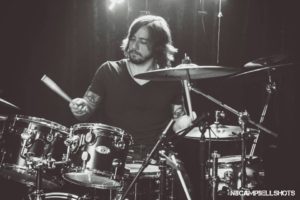
Jamie: What is it about playing drums that keeps you coming back for more?
Mike: That’s a good question. Good place to start, that’s cool. The passion of doing it, for me, it’s not only a way to positively vent any sort of frustration, but it’s something that I find inspiring. I understand rhythm naturally to a certain point. I’m not a total genius musician kind of guy at all. I know I have to work on time signatures and stuff. It doesn’t just click in my head. But I keep coming back to it for more because it’s the one thing everyday where I can be totally in the moment, throwing down chops or laying down grooves, and feeling inspired as a person and a player.
Jamie: Can you please tell us about the bands that you are currently playing in?
Mike: I’m currently playing in four bands. Bronson Rock is kind of like my main squeeze. Those are my homies from Schaumburg. The bass player, Matt, who is also in Great Sky Band. He’s like my best friend. We’ve been playing together in bands for about twelve years now. We had a project for years called AMRITA. Patrick Riley was the guitar player in that band. He’s the lead singer in the Radiohead tribute band in Chicago, Kid A. Matt and I came from there with him. We started with some friends in Schaumburg a few years ago. Bronson is kind of like a hard rock, jamming, progressive rock band. That’s where I use the most double kick drum stuff. It’s the heaviest band I’m in. Kyle, the lead guitar player is pretty shreddy. We just have fun putting the energy out there, and hopefully people feed off of it and stuff. That’s my hometown crew, or my main squeeze.
I also play in Thinner Teed. Also from that AMRITA connection. Jason Carney, the keyboard player, has been with this band for about four years. He did double duty with AMRITA and Thinner Teed. He was in that with me, Matt and Patrick and eventually he asked me to join this group so I’ve been with them for a while. They’re based in the Northwest suburbs (of Chicago). They do this thing called Midwestival Productions. Brad, the guitar player kind of runs the whole thing. We play a lot of local festivals out this way like Summer Stomp. There’s this one called Down on the Farm that this band from Minneapolis called Soap hosts. These guys are on that bill every year. Jason writes some of the tunes in this band. We’re kind like a dancey, funky band. There’s a lot of four-on-the-floor feel. Kind of a groovy band live. There’s a lot of that [mimics four bass drum hits]. There’s also some Phishy type stuff too. Some compositional, instrumental pieces. That’s number two.
Then there’s this band I’m in called Great Sky Band, as you know. Ian Engels sings and plays guitar alongside Sean Briskey, and Matt plays bass. They’re formerly The Pistachio Brothers. Ian and A.J. O’Reilly were playing as a duo. They played some of those shows with Allstar Vibe Entertainment last year, which my friend Jim Turk booked some of those Stash House of Blues shows, Fall Stash, Summer Stash, Spring Stash, etc, Then last year I got to know Ian Engels through that part of the scene. He played an open house party with us in Palatine. I brought my drums out and everything. He and A.J. asked Matt and I to join their group. Then Ian and A.J. had some sort of falling out, so Ian brought in Sean Briskey since they already played together in a couple of bands, including one with you (Jamie Dull), called Stampy [laughs]. So they have a really good chemistry. They play really well together. And Matt and I have brought some of our rock sensibility to the group. Where as Ian has kind of a surf rock, reggae, bluegrass, Americana kind of a thing that he does. More singer-songwriter type stuff as well, which is sort of like what you guys do in Stampy. Which is really great by the way. I love it. I just play in a bunch of jam bands, but I love singer-songwriter stuff [laughs]. We have that going on really well in Great Sky Band.
The fourth band I play in is called Rusty Gates. Same kind of thing. It’s a jam oriented band, but with more of a jazz influence. Pat Riddle went to music school and Josh (the keyboard player) teaches music and theater. So it’s a musically oriented band. Not that I follow charts or anything. It’s still original, jammy music. There’s a little more of a jazz influence with what they’re doing. But also jammy and funky. I have the same, similar style of drumming in all four of my bands. I play the same way in all of them, but the band around incorporates different styles. I throw in my rock-fusion style when I can to match whatever the other members’ in the band’s sound is.
Jamie: Tell us about your early days. Do you remember the first time you were playing in a group and thought that you might want to pursue this as a career?
Mike: I’m 31 years old now. I started playing when I was seven. I kind of naturally gravitated towards drums. I was never really interested in any other instrument. My dad is a guitar player and takes it pretty seriously too. He’s been gigging his whole life. It’s not his career, but it’s been his part time job his whole life. So I picked it up naturally by being influenced by him. I sort of had a knack for it. I could play a real basic beat when I was young. My parents saw that I had a natural thing for it so I kept progressing with it. I made goofy bands with my friends when we were in grade school. And in freshman year of high school I had a punk rock cover band. An emo band sophomore year. And then junior year I started this band called The Academy Is… I was the original drummer. We started it in my parents’ basement out in Schaumburg. I went to high school with one of the guys and then we grabbed a couple of other people from Barrington, IL. We gained some ground really quickly. We were on tour with Less Than Jake within a year of being a band. We toured the whole east coast and then went out west too. Through the central U.S. then out to Arizona, California and New Mexico.
Jamie: Were you eighteen already when you went on tour?
Mike: It was senior year of high school, second semester, and I had to miss two weeks of school so that I could go on tour. That was kind of my first taste of the road. And I really haven’t toured much since then. I was out for the entire summer of 2004 when I was 18 years old. I took a year or two off after I parted ways with that band, and then two years later I started AMRITA with Patrick Riley and Matt. And that was our band for about eight years until 2014. It had influences of Incubus and Mars Volta, with a little bit of that Umphrey’s McGee sound. Some alternative and progressive styles in there with an indie spin. It was a really unique sound for a band. We did that for eight years and then in 2013 I started Bronson Rock. Then in 2015 I joined the other three bands I’m in.
Jamie: What a great ride you’ve had!
Mike: Yeah. It’s been local for twelve years. I haven’t toured in twelve years so it’s been just local gigging since then. As you know, life catches up with you. Jobs, bills, and stuff.
Jamie: Right. Can you tell us some of the unique challenges you’ve had playing in and around Chicago?
Mike: I would say to stick out as a player in Chicago has been a challenge. As you know, you have to draw people to shows. And I live out in the suburbs. I’m not really much of a social kind of guy. I try to let my playing do the talking for the most part because I love it and I take the playing aspect of it really seriously. I guess just trying to balance your social life into what you do and get other people excited about it can be challenging. For yourself, inwardly, to get out there and do it. Trying to balance the two can be difficult.
Jamie: Are there any particular shows that you played in the early days that was a turning point for you? Or do you remember any specific show being really special?
Mike: Yeah. I got to play House of Blues in Myrtle Beach, SC when I was 18 years old. That was really cool. I got to play this pretty big minor league hockey arena in Columbus, OH. It had like three decks. It was cool to see big stages at a young age. But I took a little more pride later in life when I was in AMRITA and stuff and we got our first House of Blues gig where we headlined. As goofy as it sounds, me and Jason, the keyboard player had our stuff on risers in the back, and they had the house kit down on the front of the stage. Not that I make other drummers have to play down front, but it was really cool to feel like the headliner and stuff. My kit was sitting up there and nobody else was playing it because we were the headliner. I felt like we worked really hard to get there. It was just really cool. I felt like we actually had done some work to get there. This was about five years ago before a lot of these shows started getting offered regularly to more of the local bands.
We had a show in early 2012 at the House of Blues with AMRITA that was really cool. We also played a record release show at Cubby Bear in 2010 and brought out like 400 people. That was a big one for us. And recently in Bronson Rock we’ve played at Tonic Room a lot. There’s something about that room, when you pack it and everyone is rocking out, its great. The rooms keep getting smaller, but it’s more about the people and the camaraderie.
Jamie: You’ve played some great shows! Have you experienced any really difficult load in situations with your gear?
Mike: I don’t have anything specifically, but I know what it’s like when you have to play in the winter time. It can be difficult when you have to move your hardware case, and your hard shell cases when it’s snowing. Having to load-in and load-out in sub-zero temperatures. It can be really hard. I don’t have a specific instance when it’s been particularly terrible, but I’ve gotten my gear rained on, snowed on, that sort of thing. Sometimes a venue will tell you to get your stuff off stage and you have to break it down outside in the pouring rain.
Once I played a show in a barn with AMRITA in 2008. It was kind of a cool show, but it was 100 degrees outside and we had to play inside this tin room. It was really hot so we had to play shirtless and stuff. It was rough, to the point where we thought we’d pass out. I remember how incredibly hot it was.
Jamie: Cool! Tell us how the city of Chicago has been instrumental in your career development. Would you have had the same results if you had grown up playing somewhere else?
Mike: Yes and no to the second question. A lot of the guys that have been around Chicago are really helpful, passionate people. Great musicians, people that want to promote good music, people who want to spread the word. We have a really powerhouse filled music scene. I would guess one of the best in the country, but I don’t tour so I don’t know. Everyone says Chicago’s music scene is great and I will back that 110% because it’s been very accepting of me and very kind to me. Even at this level, I don’t tour and stuff, but I feel lucky to be playing in a bunch of bands. I’m getting better everyday and I love doing it. It puts me back in the moment. I get to do it a lot and Chicago has been very helpful in getting me to do that by having an amazing music scene.
Jamie: Can you tell us who some of the drummers were that were really influential on you when you were young?
Mike: The first drummer I really got into was Chad Sexton from 311. He always had a nice pocket. I was big into them in grade school. They were my favorite band. I started digging on their stuff in first grade. When I started playing drums Chad was the first dude I gravitated towards. I liked his snare tone a lot and the pocket that he had. Even to this day I’m a pretty pocket oriented drummer. I’m busy within it I guess, but the basis of it is still pocket. I don’t play a lot of crazy polyrhythmic jazz or anything. And I attribute that still to the first drummer that influenced me for a few years. And then of course John Bonham, who I got into when I was older. As you know, you’re a big fan of him [laughs].
Jamie: Definitely! I pretend to be him sometimes at shows [laughs].
Mike: I hear that man. I have a Bonham tattoo actually. The circle thing, I got that. But yeah when I started to get into it after high school, into my twenties and stuff, I had a big Led Zeppelin phase. Bonham was a big influence of mine. Then I started to get into more jazz fusion, progressive players after that, like Dave Weckl. Vinnie Colaiuta is probably my favorite drummer right now. One of them at least. I like his approach to everything. And what a great idol, right? He’s been in the industry for decades playing with all sorts of great artists. He’s easily one of my favorite people and drummers right now.
Jamie: Right on! Great drummers indeed. So now I have a question for you that may or may not apply. Has there been any point so far in your career that you’ve needed a drum tech, have wanted one, or do you expect to have one in the future?
Mike: Hmm. Interesting question. I don’t have too much to say on the topic actually. I’ve never had one and I’m pretty anal about my setup. I don’t know when I’d have the opportunity to have a drum tech. I’d be open to the idea but I’d probably have to go over how I wanted things. I don’t really know much about it. I’ve never had one.
Jamie: Fair enough. Let’s keep moving forward. Since you and I are both the same age, I know we’ve seen the same consistent changes in technology through the years. So tell us, do you think social media makes it easier for up and coming drummers to get noticed? Or is it more challenging now to make yourself standout among the millions of other users?
Mike: I’ve found it to be easier. It’s kind of the main reason I have a Facebook page these days. To promote music. I keep it mostly for bands. It’s been a good tool for everybody. Being able to tag people and give direct links to information. With everyone having phones in their pockets, the information is right there instantaneously. I’d say it’s a good thing overall. It can lead to over-saturation which is one of the challenges about living in Chicago. There’s a lot of people, it’s a big scene so sticking out can be hard. But so far in my corner I feel like I’ve done well and I think social media has definitely helped with that.
Jamie: Awesome! Good answer. I have just a few more questions for you. Do you feel that you’ve developed your own style and sound as a drummer? And if so, is it something you’ve worked on specifically? Or do you feel that it revealed itself over time?
Mike: Yeah I’ve taken, along the way, influence and specific chops and groove styles and feels from each player that I named earlier and a thousand more. Even a cool fill here and there that you see out at a show or seen on tv, you might think, “I think I know what that chop was”, and learn it. Accumulating all of that influence along the way makes everyone their own player because everyone’s had their own combination of influence, so it’s totally unique to the individual. How they throw down their groove and chop style,and who and what they prefer to play like. It kind of gives everybody an individual sound, I think.
Jamie: Yeah I totally agree! Let’s switch gears again. What has become your favorite venue in Chicago to play? Can you tell us about it?
Mike: There’s a lot of great rooms. Currently, packing the house at Tonic Room is a lot of fun. All the guys that work there, and the owner, we all know them on a personal level. They’re great guys. It’s one of the hottest places in Chicago right now. It’s a tiny room, but it’s a really great spot to play. Let’s see, what else? I got to play House of Blues in Chicago three times last year. Twice with Bronson Rock and once with this superjam thing we did, on the main stage. That was a lot of fun for sure. On the local level Tonic Room is probably the jam right now. I’ve also always liked Double Door. I haven’t played there in years but it’s always been one of my favorite spots in Chicago.
Jamie: Yeah man. I love those spots too. Are there any local drummers in Chicago right now that you know of that you’re really into?
Mike: Oh yeah. There’s a bunch of good players in the area. My buddy Justin Sova, he’s not in a group right now but he’s played with a bunch of gigging bands including some gospel and R&B stuff. He’s got a nice pocket. And Steve Florian. He plays in IndigoSun. He’s a fantastic drummer for sure. I’ve always like his playing. There’s a handful of other guys, but those are two that come to mind.
Jamie: That’s awesome. I like Steve’s playing too. He’s really great! So to wrap it up, I have one last question for you. It may seem cliche’, but I think younger drummers can learn a lot from this. My question is, what has been the single, most important lesson you’ve learned from playing drums in your lifetime?
Mike: If you’re passionate about it and go all in you’ll find out as you’re doing it, that if you have the potential to be really good or care about it enough, even as a passion or hobby or something, you can easily be in the moment. Be really passionate about this so you can discover what you can do as a player and as yourself. Try and be in the moment. If you fully immerse yourself in it, the potential is unlimited.
Jamie: Wonderfully said. I could not agree more. Thank you so much for your time and knowledge!
Mike: Absolutely. Thanks for speaking with me.
======================================================================================================
For more on Kris Myers and Umphrey’s McGee, click here
For more on Mike Del Principe and his bands, click here
Related Articles
-
 Legendary Mask Maker, Zagone Studios,...
Legendary Mask Maker, Zagone Studios,...Oct 25, 2021 1
-
 Photo Gallery: John Spencer @ House of...
Photo Gallery: John Spencer @ House of...Dec 08, 2025 0
-
 Photo Gallery: Los Lobos live at Space...
Photo Gallery: Los Lobos live at Space...Dec 03, 2025 0
-
 A Swingin’ Sleigh Ride: Squirrel Nut...
A Swingin’ Sleigh Ride: Squirrel Nut...Dec 03, 2025 0
-
 Hubbard’s Phenomenal Fall Series...
Hubbard’s Phenomenal Fall Series...Dec 02, 2025 0
More in this category
-
 A Swingin’ Sleigh Ride: Squirrel Nut...
A Swingin’ Sleigh Ride: Squirrel Nut...Dec 03, 2025 0
-
 Hubbard’s Phenomenal Fall Series...
Hubbard’s Phenomenal Fall Series...Dec 02, 2025 0
-
 Martin Atkins Resurrects A Post-Punk...
Martin Atkins Resurrects A Post-Punk...Dec 01, 2025 2
-
 Paul McCartney Closes “Got Back”...
Paul McCartney Closes “Got Back”...Nov 26, 2025 0



